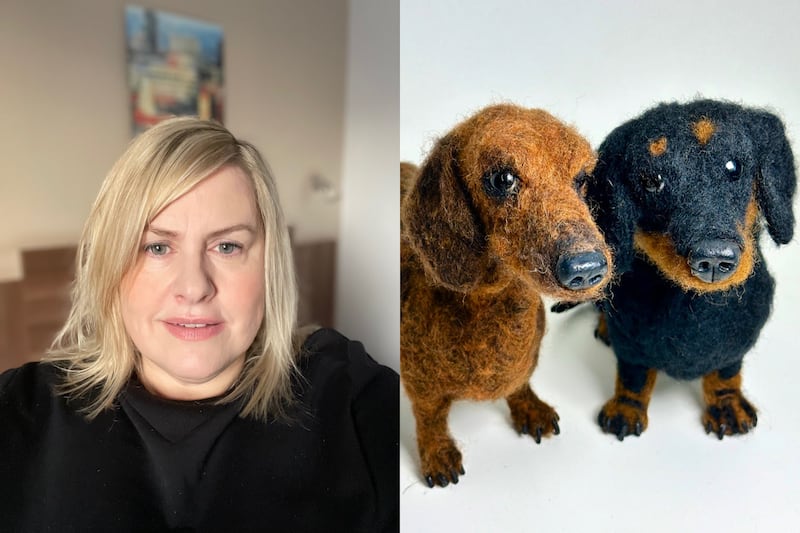A woman who spent years having three-month bipolar “cycles” of depressive and manic episodes, causing her to think she had been recruited by MI5 as a spy and make multiple suicide attempts, claims “art saved (her) life” and got her out of “an incredibly dark place”.
Sarah Graham is “now in remission” and a successful artist, appearing on the GCSE art exam paper as well as producing pieces for celebrities.
The 45-year-old, who lives in Letchworth, Hertfordshire, had her first episode in September 2005, a year after her father died, where she was “paranoid, scared and anxious”, and her depression was “so severe” that she tried to take her own life.
At the time, she was “in denial” that she had a mental illness because her “biggest fear” was developing bipolar disorder like her dad, for which he was “sectioned regularly”.
It took Sarah more than a year to recover from her first episode, but, in 2015, she began to “cycle rapidly”, spending “three months being depressed and three months feeling high”, and was diagnosed with bipolar, and attempted suicide.
In 2017, she developed more signs of mania, such as thinking she was a spy for MI5, that she could “communicate” with John Lennon, and that she was “foiling a terror plot and thought (she) needed Harrison Ford to help”.
The same year, Sarah was sectioned and thought the hospital was a “superpowers academy”, but, when she went home, she experienced a “train crash of emotion” and she slipped into “the deepest, longest depression” she had ever suffered.

Over time, she “gradually” began going back to her art studio, and felt as though she had been “given a ladder and (her) art was the first rung”.
In 2022, she was discharged from the Adult Community Mental Health Team in Hertfordshire and is now in “such a happy place”.
Sarah “began feeling ill” in 2005, a year after her father, who also had bipolar disorder, died.
She told PA Real Life: “It was really serious, and within a few days I was very ill, wasn’t sleeping and was paranoid, scared and anxious – I thought I’d committed fraud, and I thought I was going to be going to prison.
“I even thought I was the root of all evil – I stopped eating because of that, I didn’t think I deserved food.
“The depression was so severe and so relentless, and suffocating, and frightening – it drove me to try to take my own life at the beginning of November that year, I was in an incredibly dark place.”

Sarah then went into hospital and was moved to the psychiatric unit, where she stayed for a month, but was “in denial” that she had a mental health illness.
She explained: “My dad had bipolar and I’d grown up with it, so my biggest fear was to develop it and have the same thing happen to me – because he was sectioned regularly.
“He had really severe manic episodes, and really erratic behaviour, so it was tough as a kid, but he was my absolute hero.
“I always understood it was an illness and it wasn’t his fault.
“When he was well he was a gentle, caring, intelligent father so it was heart-breaking for all of us as a family to see his behaviour change so dramatically when he was having a manic episode.”
After a colleague of Sarah’s noticed there was something wrong, she went to her GP and was referred to the Adult Community Mental Health Team for Hertfordshire. As her symptoms worsened, her care was escalated to Lister Hospital’s Crisis Team, who visited her every day.

It took Sarah more than a year to recover, but in 2009 she began to “suffer again”.
She said: “This time around, I was diagnosed with major depressive disorder – I had just got married to my long-term boyfriend, and after the wedding I felt so low.
“The episodes gradually increased in their severity, and by 2015 I started to cycle rapidly, so I would spend three months being depressed, and three months feeling a moderate high.
“In the same year I got diagnosed with bipolar type two, which means I was having depressive episodes and hypomanic episodes, but not full-blown manic episodes, and I tried to take my own life again that year.”
In 2017 Sarah had her first extreme manic episode, which began in June and reached a “crescendo” at the end of August, and was fast-tracked to the crisis team.
She explained: “It was filled with paranoia, delusions, euphoria, and grandiose ideas – there was always a seed of some kind of truth or something happening in my life that would lead me to believe something that wasn’t true.

“So I thought I was working for MI5 as a spy – I applied on the application’s website and filled out a form, but I took it to the next level and believed I had been successful and was now a spy.
“I thought I was psychic, and could communicate with John Lennon through the weather.
“I thought I’d met David Bowie and flew to space on an asteroid with him.
“I thought I was foiling a terror plot and thought I needed Harrison Ford to help me – I thought he lived in a house outside my town so I was trying to knock on a stranger’s door in the middle of the night.
“I also thought flies were aliens and that I had all the answers to all the questions in the universe.”
The same year, Sarah was sectioned and was “livid” because she “believed everything was true” – when she got wind that the crisis mental health team were looking for her, she stayed in hotels to avoid them.

She said: “One morning, I thought I was going to be having breakfast with the Queen and Prince Philip because I believed that they were going to congratulate me for foiling the terror plot – I went to my art studio and got lots of little presents for them, including some art prints.
“But, when I got downstairs at the hotel, the police were waiting for me.
“I thought the hospital was a superpowers academy and I felt euphoric.”
Sarah was sectioned for 28 days, and believed it was all part of her “spy mission” but when she went home the reality was that her marriage fell apart and she “was heartbroken”.
She said: “It was like a train crash of emotion and I just sank to rock bottom – it was almost like the reality of all those things I’ve done over the last three or four months came at me all at once, and it just sent me into the deepest, longest depression I’ve ever had.
“I was in a state of depression for a year – my marriage had just ended, and I had lost friends throughout all of this.”

However, Sarah began putting all of her emotion into her art, photorealist oil paintings often depicting brightly coloured sweets and retro toys, and it helped her take the steps to slowly be in remission.
She said: “I always had my art throughout all of this, art saved my life.
“I was in the deepest, darkest hole, and it was like being given a ladder, and my art was the first rung on that ladder.
“Once I got back to the studio, I went back very gradually, with the encouragement of my friends and family who stuck by me, and it really carried me on the path of recovery.
“It gave me a purpose, something positive to put my energy into and rebuild my life.
“It was the glimmer of hope that I needed.”

Sarah recalled some of her career highlights to date: “I appeared as a guest judge on CBBC’s Britain’s Best Young Artist in 2022, painted the album cover for the Kaiser Chiefs’ album Souvenir, and I auctioned the original painting for £10,000 which I donated to the hospice that my dad and my best friend were in when they passed away.
“My art is studied in GCSE art classes, I’m a mental health advocate, I’ve had exhibitions in Harrods, and sold pieces to celebrities such as Roger Federer.”
Since having so many successes, Sarah has been discharged from the community mental health team in 2022 and is now classed as being “in remission”.
She said: “Now, I’m in such a good place, and such a strong place, and such a happy place.
“I don’t think I would have gotten here had I not been through everything I’ve been through, because I’ve got so much gratitude now for my sanity.”
Now, Sarah wants to focus on raising money for her local Samaritans, in Hitchin, who she called “countless times”.

She is currently working on a campaign, Samaravans, sending campervan stencils to schools, established artists and celebrities, such as Joe Lycett and Leigh Francis, for them to create artwork from and eventually auction off.
Looking back on her experiences, she said: “If someone handed me a crystal ball when I was at my worst, and showed me where I was today, I never would have believed it.
“I’m so thankful that I have this talent, and for my dad, who never gave up on me and always told me I should pursue art.”
For support, contact:
Samaritans on 116 123, jo@samaritans.org, or visit www.samaritans.org to find your nearest branch.
The Calm Zone on www.thecalmzone.net/.
Bipolar UK on www.bipolaruk.org/.






